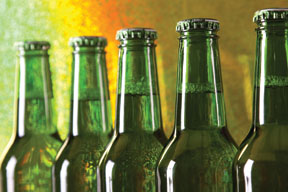| << Back |
Going Green: Into the Eco-Spirit – Beer and Wine the Organic Way
By Chad Felix
There’s only so much we can do to offset our personal carbon footprints. Already, we’ve changed out light bulbs, opted for more fuel-efficient cars, monitored our water usage and switched to organic produce. But just when you think you can’t get any “greener”, a new sector of business enters the fold. In this case, we’re talking about vintners and craft brewers who’ve turned wine and beer making into an eco-conscious art. When it comes to imbibing on these organic creations, showing mother Earth some love isn’t just simple; it can be a romping good time, too.
Organic, Defined
Eco-buzzwords run rampant in market places. Terms such as “sustainable”, “green”, “eco-friendly” and more adorn packaging, often with little to no explanation as to what they actually mean. The most heated debate in the worlds of beer and wine is over the “O” word: organic. In general, here is what the title means:
- Products are developed without the aid of fertilizers, toxic agents, chemical seed treatments or “-cides” (pesticides, herbicides, fungicides, etc.).
- Products are monitored and certified by a formal institution (in the United States this is the USDA) that grants the product official integrity.
- 95% of the product’s total ingredients are up to organic standards.
As we are dealing with international industries, it is important to note that organic standards vary by country, so you’ll have to pay close attention to the label. Now, let’s see how these guidelines affect our favorite libations.
Earth Friendly Brews
There’s been a kind-of renaissance in the beer community; one led by the unconventional hop-practices of a new generation of organic craft brewers. While their recipes don’t veer far from a traditional blend of barley and hops, with wheat, fruit, cocoa, etc. often added for flavor, brewing with organic ingredients affects nearly everything. In fact, many believe organic is the way beer should always be. The taste, some attest, is fresher and bolder. Because it’s made with better ingredients, the fermentation process is purer, leading to a notably clearer brew. Not to mention the health and environmental pros–it’s all-natural, chemical-free and requires 50% less energy to produce.
In keeping with the long history of experimentation in the craft, organic incarnations are plentiful and diverse. Eco-offerings vary from classics like North Coast’s Belgian Style Ale, Samuel Smith’s Organic Ale and New Belgium’s Mothership Wit, to more off-kilter selections like Peak Organic’s Hop Noir black IPA or Espresso Amber Ale. These can usually be found in stores such as Whole Foods and Sunflower Market.
Eco-Concerns
There is but one noteworthy shortfall to organic beer. Because the USDA only requires certified products to be 95% organic by weight, it is most often produced with non-organic hops, as they are a challenge to grow organically. For purists, it is a controversial source of weakness in organic beer standards. For more details, check out www.beeractivist.com and search “The Organic Hops Controversy”.
Green by the Glass
The jury is still out on whether or not organic wine is better than conventional overall. Advocates believe that the taste of a good organic wine, for its lack of chemicals, more wholly embodies the characteristics of the region in which it was cultivated. Skeptics contest that this same lack of artificial ingredients results in bottles that are inconsistent in taste. It is worth mentioning, however, that one of the most expensive wines in the world, the lavish Romanee-Conti, is organic. Try organic and see for yourself! Pick up a bottle of Bonterra’s Red Table (about $10) or choose from one of De Tierra’s many offerings, available at Khoury’s Fine Wine & Spirits (www.khourysfinewine.com).
Mind the Labels
Organic wines come tagged in many ways. The label “100% Organic Grapes” is the most common. While that claim may be accurate, most of these wines still contain sulfur dioxide (NSA), a preservative that helps the wine to age. This is of primary concern to the serious organic community, as NSA is not considered organic. Without such a preservative, wine only lasts between six to twelve months. For die-hard wine drinkers who believe that the aging process releases the true delicacies of the drink, this can be a deal breaker.
Other labels include “Natural” and “Sustainable”, indicating the producer has gone above and beyond organic requirements. In producing “Natural” wine, makers involve themselves in the process as little as possible, leaving the flavor solely up to the grapes by refuting additives and processes such as micro-oxygenation and reverse osmosis. “Sustainable” wine producers increase their wine’s quality by invoking some of nature’s best qualities. Using compost, for example, they intentionally attract insects and plant-life that benefit grape flavor. As early champions of the organic movement, The Organic Wine Company is a great resource for further information. Check them out at www.theorganicwinecompany.com.
Getting into the spirit of organic living is a learning process for all of us, and sure, it can be a tad overwhelming. Just keep in mind the most important thing: anytime you encourage an industry’s efforts to become more sustainable, you send a positive message not just to them, but to other industries as well. Support eco-conscious living, keep at it and enjoy it for what it is. After all, it’s not often enough that we can say to each other in earnest, “For the good of our planet and our bodies, drink up!”








